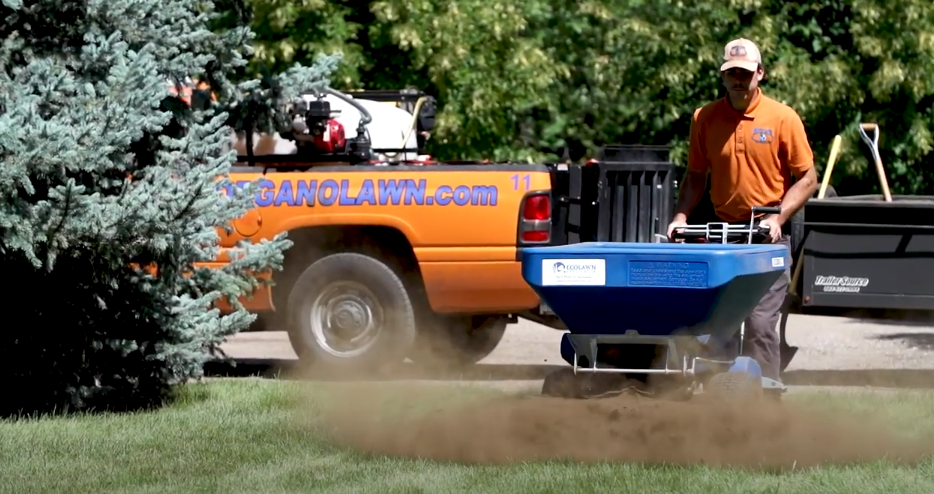HUMATE SOIL CONDITIONER FOR LAWNS
Organic Soil Builder
Humate is One of the Most Effective Lawn Treatments
Humate soil conditioner for lawns is an outstanding organic treatment for enhancing soil health and stimulating beneficial microorganisms. Just one application of humate soil conditioner is equivalent to applying 1/4 inch of premium organic compost across your lawn. This product is one of Organo-Lawn’s most remarkable lawn and tree care solutions due to its ability to revitalize soil while being more cost-effective and easier to use than traditional compost top dressing.
Dramatically Improves Clay Soils
For lawns with heavy clay soil, we highly recommend one to two applications of Humate Soil Conditioner each year. Many customers in Boulder and Fort Collins have seen a dramatic improvement in their lawn’s health, experiencing stronger roots, better water retention, and richer soil after consistent annual use of this powerful organic conditioner.
Granular Humate Soil Conditioner Treatment
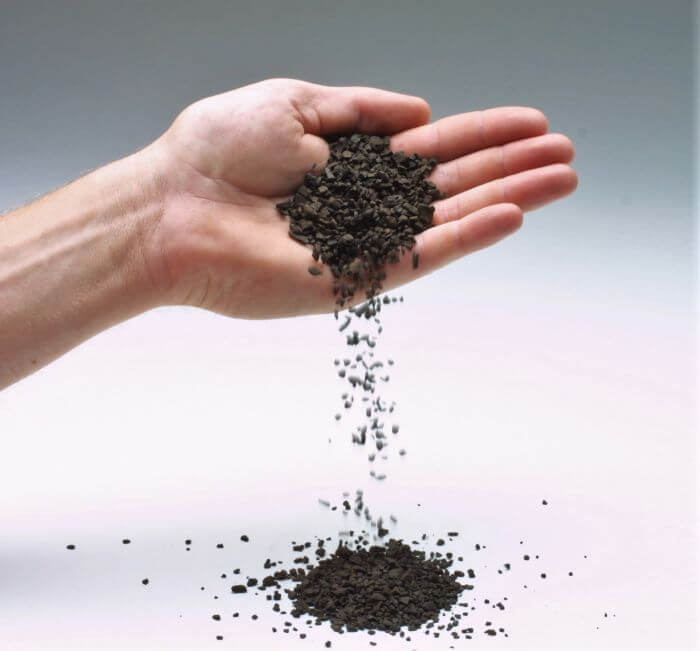
What is Humate Soil Conditioner for Lawns?
Million Year Old Organic Matter
Humate is a naturally occurring, organic soil amendment derived from decomposed plant and animal matter, typically found in deposits of ancient peat or lignite (soft brown coal). It is rich in humic substances, which include humic acid, fulvic acid, and other organic compounds that significantly enhance soil health and plant growth.
Key Components of Humate
- Humic Acid: Improves nutrient availability and retention in the soil.
- Fulvic Acid: Enhances nutrient uptake and boosts plant metabolism.
- Trace Minerals: Contains essential micronutrients for soil and plants.
- Organic Carbon: Adds organic matter to improve soil structure and microbial activity.
Granular Humate Lawn Treatment
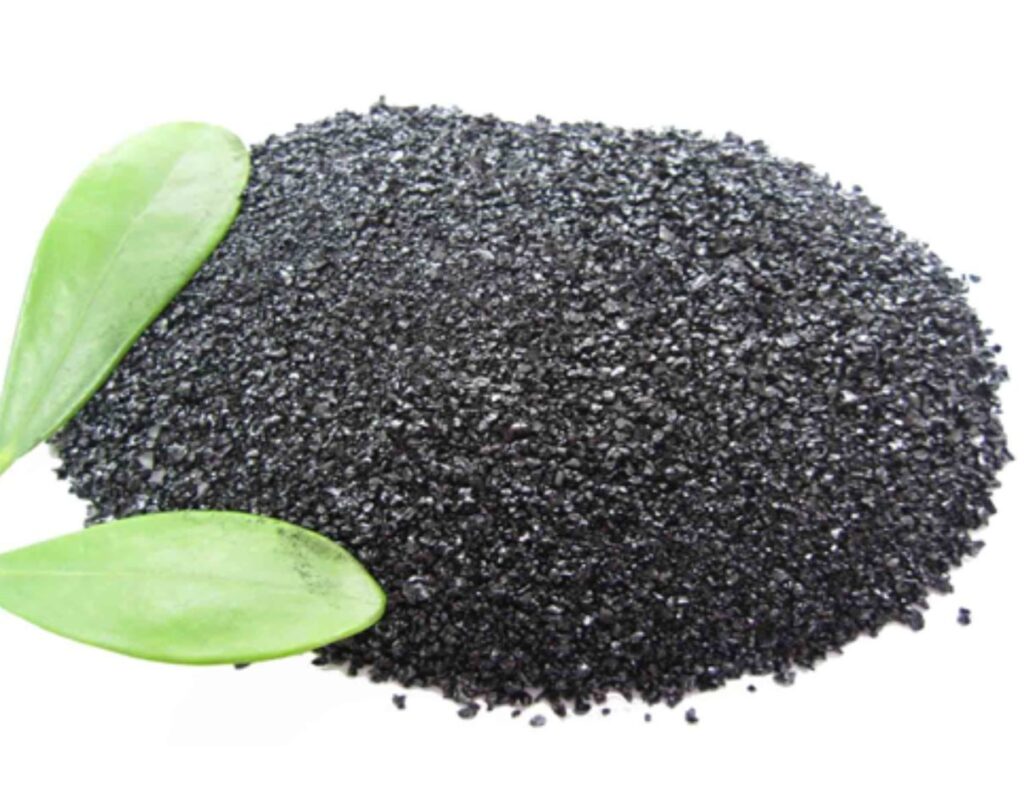
What are the Key Benefits of Humate?
Improves Soil Health
- Enhances soil structure, making it more aerated and less compacted.
- Increases water retention, especially in sandy soils.
- Helps heavy clay soils drain better.
Boosts Nutrient Efficiency
- Binds to nutrients like nitrogen, phosphorus, and potassium, reducing leaching.
- Releases nutrients slowly, ensuring plants have a steady supply.
Supports Microbial Life
- Feeds beneficial soil microbes, which improve nutrient cycling and plant health.
Encourages Root Growth
- Promotes deeper and more extensive root systems for better drought resistance.
Benefits of Humate for Grass
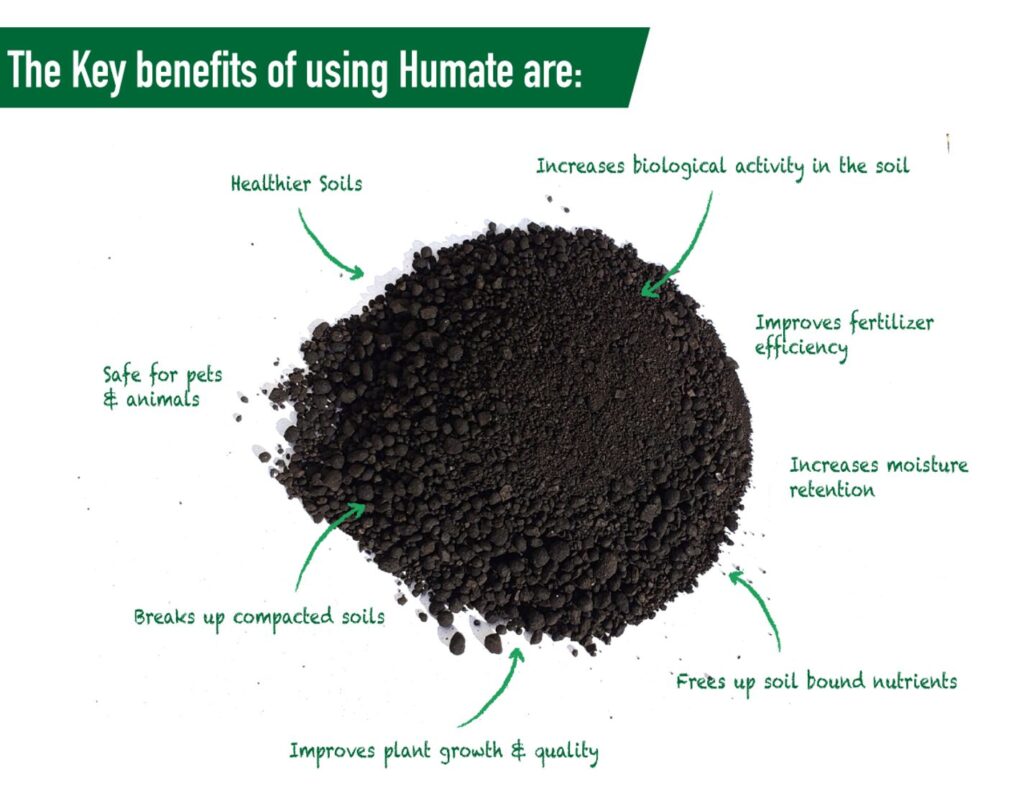
Reduces Stress
- Helps plants cope with environmental stresses like drought, salinity, and extreme temperatures.
Eco-Friendly
- Reduces reliance on chemical fertilizers by improving soil’s natural fertility.
Humate is Edible!
- Humate is completely natural and edible, often used as a nutritional supplement in livestock feed, particularly for cows, to aid digestion, improve nutrient absorption, and support overall health.
Promotes Deep Digging Roots
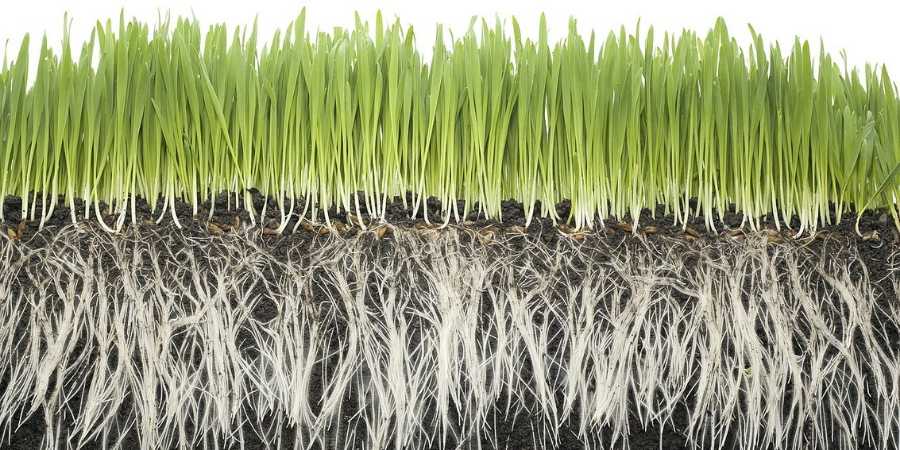
Is Humate the Same as Compost?
Key Differences Between Humate and Compost
No, humate is not the same as compost—though both enhance soil health, they differ in composition, function, and application.
- Humate is a concentrated source of humic substances derived from ancient organic deposits. It improves soil structure, nutrient availability, and root development on a deeper level.
- Compost consists of decomposed organic materials like food scraps and yard waste. It enriches soil with organic matter and beneficial microbes, promoting overall fertility.
Both are valuable soil amendments, but humate works at the molecular level to enhance nutrient absorption, while compost adds bulk organic matter to improve soil texture and microbial activity. Using them together can maximize soil health and plant growth!
Granulated Humate for Lawn Care
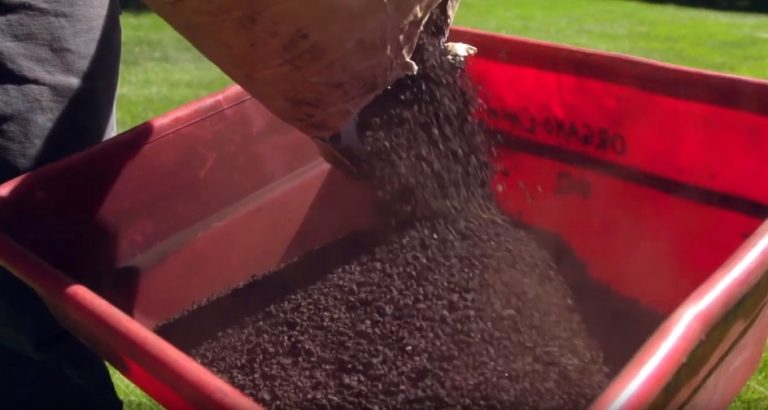
Humate Lawn Treatment
Humate Source: Derived from ancient organic matter, such as lignite or leonardite.
Composition: Highly concentrated in humic substances like humic and fulvic acids, rich in carbon and trace minerals.
Function: Enhances soil structure, increases nutrient retention, and improves microbial activity by creating a supportive environment.
Application: Typically used in smaller quantities as a soil amendment to boost soil fertility and nutrient uptake.
Compost for Lawns
Compost Source: Made from decomposed organic materials like food scraps, yard waste, and manure.
Composition: A mix of macronutrients, micronutrients, and organic matter in a decomposed form.
Function: Provides immediate nutrients to plants, improves soil texture, and introduces beneficial microbes to the soil.
Application: Applied in larger quantities, builds soil, stimulates beneficial microbes in the soil, and improves soil health and nutrients.
Humate Soil Conditioner for Lawns
Humate Builds Soil Health
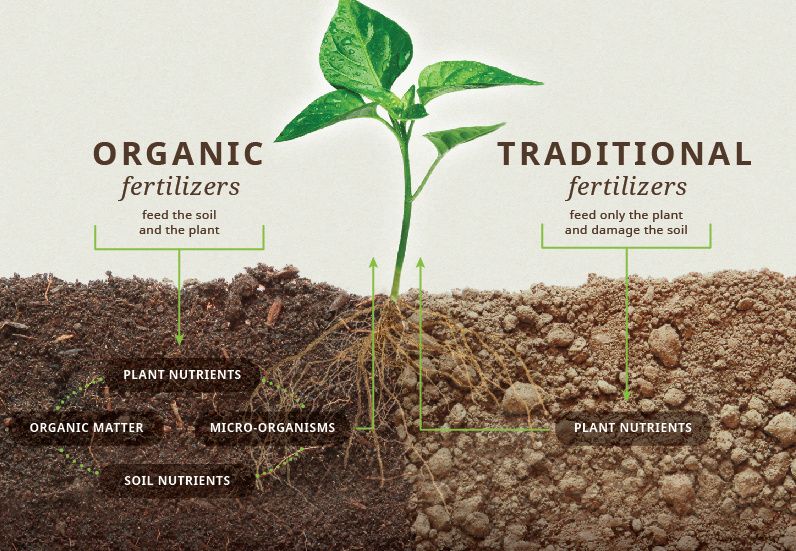
Recommended Uses for Humate Soil Conditioner
Before the Heat of the Summer
We typically apply a round of Humate to lawns in late May or early June (before the summer heat).
Seeding a Lawn
We usually apply Humate when seeding a lawn. Humate is proven to increase seed germination.
To Treat Lawn Diseases
We usually recommend an application of Humate when a lawn is diseased.
With an Aeration
After an aeration, a Humate application is recommended because it will get deeper into the soil and stimulate microbial activity in the soil at a deeper level.
Humate soil conditioner can be applied to lawns any time of year in the Boulder area or Fort Collins area.
Humate Application Season
- Any time of year (as long as there isn’t snow on the ground)
- There are no watering requirements for the treatment!
Humate for Stressed Lawns
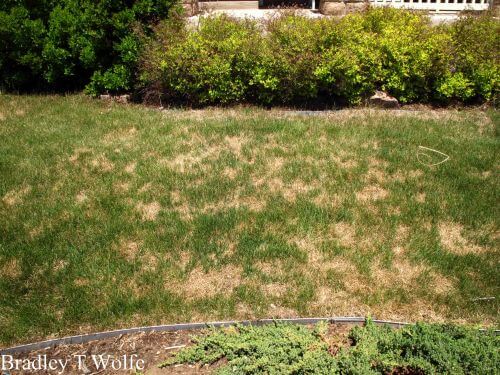
Order a Humate Application for Your Lawn
(303) 499-2000 Boulder or (970) 225-9425 Fort Collins
Humate Soil Conditioner for Lawns FAQs
Is Humate Soil Conditioner for Lawns Safe?
Department of Ag Rules
According to the Colorado Department of Agriculture we legally cannot claim anything is safe. They even say water is not safe! That being said, if Humate is used correctly there should be no harm to humans or animals. It is a natural, organic product derived from decomposed plant and animal matter, primarily found in ancient deposits like leonardite or lignite. Humate is widely used in agriculture, gardening, and landscaping to improve soil health and plant vitality.
Safe For People and Pets?
Non-Toxic: Humate soil conditioner for lawns is non-toxic and should not cause any issues for humans and animals.
Edible: Humate is mined from the earth and it is even edible. Humate is often used as a nutritional supplement in livestock feed, particularly for cows, to aid digestion, improve nutrient absorption, and support overall health.
Environmentally Friendly
Eco-Friendly: Being organic, humate does not harm the environment and is biodegradable. Humate even filters out pollution and toxins from soils.
No Hazardous Chemicals: It does not contain synthetic additives or harmful substances that can leach into water systems or damage ecosystems.
For Soil and Plants
Enhances Soil Health: Humate improves soil structure, promotes microbial activity, and enhances nutrient availability without introducing harmful residues.
Sustainable Alternative: It reduces reliance on chemical fertilizers, minimizing the risk of soil degradation or contamination.
When applied responsibly, humate is a non-toxic and effective soil amendment that benefits plants, the environment, and long-term soil health.
FAQs Humate for Lawns
Humate is applied as granules using a broadcast spreader. Its coal black color makes it difficult to see on the lawn after application.
Humate stimulates soil microbes due to its rich composition of organic matter, humic substances, and trace minerals that create an ideal environment for microbial growth and activity. Here’s how it works:
Provides a Food Source
Organic Matter: Humate is rich in carbon, which serves as an energy source for microbes, fueling their growth and reproduction.
Humic and Fulvic Acids: These components are easily metabolized by soil microbes, encouraging their activity and diversity.
Enhances Soil Conditions
Improves Soil Structure: Humate helps aggregate soil particles, creating air pockets and better aeration, which supports microbial respiration.
Increases Water Retention: By retaining moisture in the soil, humate provides the hydration necessary for microbial life.
Boosts Nutrient Availability
Chelates Nutrients: Humate binds with nutrients like iron, calcium, and magnesium, making them more accessible to microbes and plants.
Supports Nitrogen Cycling: It enhances the activity of nitrogen-fixing bacteria, which convert atmospheric nitrogen into forms usable by plants.
Encourages Beneficial Microbial Communities
Fosters Diversity: Humate creates a hospitable environment for a wide variety of microbes, promoting a balanced and resilient ecosystem.
Suppresses Pathogens: A healthy microbial community encouraged by humate can outcompete harmful microbes, reducing disease pressure in the soil.
Stabilizes Soil pH
Humate can help buffer soil pH, creating a more neutral environment in which microbes thrive.
By providing nutrients, improving physical conditions, and creating a favorable chemical environment, humate acts as a catalyst for microbial life, which in turn enhances soil fertility and plant health.
We recommend watering your lawn on the next scheduled watering day. To effectively incorporate the Humate into the soil, water for one complete normal cycle. While not watering will not damage your lawn, the Humate will not start to take effect until you water.
The results of using Humate may not be immediately noticeable compared to the quick effects seen after applying fertilizer. However, while the initial results may take some time to appear, they can last for 6 to 12 weeks, making it a long-lasting option. Over time, your lawn will gradually develop a deeper, darker green color, enhancing its overall appearance. Common results include a richer green hue without excessive top growth, thicker blades of grass, and increased resistance to heat stress and foot traffic. Humate is truly a remarkable product.
Humate is a non-toxic substance that should not harm your pets or children. Although humate is an edible product often fed to cows and other farm animals, we do not recommend consuming it.
We cannot speak for other companies’ Humate, but our Humate is sourced from one of the richest deposits in the world. It is 100% pure, and the results are noticeably better. Less expensive Humate products typically contain lower levels of Humic and Fulvic acid. As a result, these lower-grade Humate products need to be applied at higher rates to achieve similar results, and they may take up to four months to become available for plant uptake. In contrast, our Humate starts working in just 3 to 8 weeks. Humate is a complex product, and not all Humate is created equal.
Humate resembles crushed coal and has a jet-black color. It is quite challenging to see on a lawn after application.
Humate usually lasts in a lawn for 6 to 8 months. We recommend applying it once each season, and twice or more for very poor soils or lawns affected by Necrotic Ring Spot Fungus.
Humate can be safely applied at a rate of 100 lbs per 1,000 sq ft, which is ten times the normal application rate. Multiple applications will not cause any damage.
Humate is a natural promoter of seed germination. When Humate is applied, it can increase grass seed germination by approximately 25% compared to using grass seed alone. Therefore, applying grass seed with Humate results in an 85% germination rate, while grass seed used on its own yields a 60% germination rate.
Soil Amendment
Enhances soil fertility by increasing microbial activity, boosting cation exchange capacity, and improving nutrient availability for plants.
Fertilizer Additive
Increases the efficiency of fertilizers by reducing nutrient leaching and minimizing waste, ensuring nutrients are better utilized.
Plant Growth Enhancer
Promotes robust root development and improves resilience to environmental stresses such as drought and soil salinity.
Environmental Applications
Supports soil reclamation efforts, mitigates heavy metal toxicity, and aids in the restoration of degraded lands.
Seed Germination: Use humate as part of a top-seeding package to significantly improve seed germination rates and establish healthier turf.
Clay Soils: Apply humate to amend heavy clay soils, commonly found in Colorado lawns, to enhance soil structure and water drainage.
Lawn Fungus Treatment: Necrotic Ring Spot: We highly recommend appling humate to lawns affected by Necrotic Ring Spot.
Ascochyta Leaf Blight Fungus: Consider using humate for lawns suffering from Ascochyta Leaf Blight or Dollar Spot to support grass health and heat resistance.
Heat and Drought Stress: Apply humate and water deeply to help lawns recover from heat or drought stress and regain vigor.
Tree Transplanting: We highly recommend applying humate when transplanting trees to encourage strong root development and reduce transplant shock.
Reclaiming Dead Soil: For lawns with “dead” or severely depleted soil, apply humate in multiple applications to restore it to a healthy, living condition.
Premium Lawn Care: Use humate consistently for homeowners aiming to achieve the best-looking, lushest, and healthiest lawn possible.
Yes! Humate enhance fertilizer efficiency by helping plants absorb nutrients more effectively, and if it is used with a chemical fertilizer it reduces fertilizer runoff and waste.
Yes! Combining humate with compost enhances soil biology and nutrient availability for even better lawn health.
Yes! Humates improve soil structure, making it looser and better aerated, which helps reduce compaction over time.
Absolutely! Humates benefit all grass types, including cool-season and warm-season varieties.
Yes! Humates reduce stress from drought, heat, and foot traffic, promoting quicker recovery and deeper root growth.
You may notice improved color and growth within a few weeks, but the full benefits develop over time with repeated applications.

